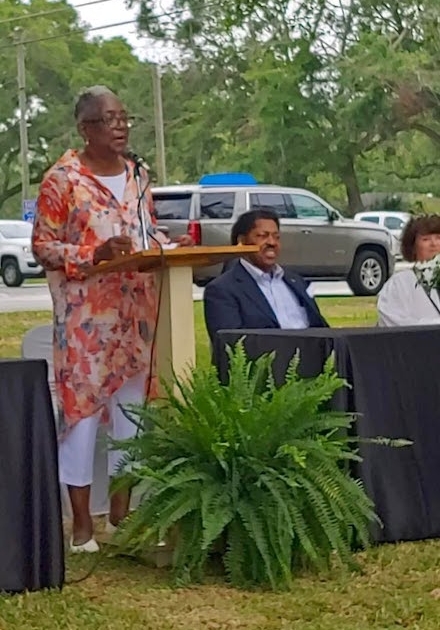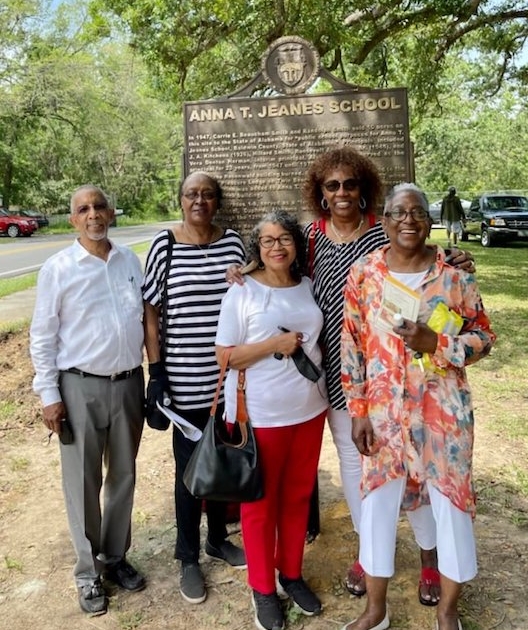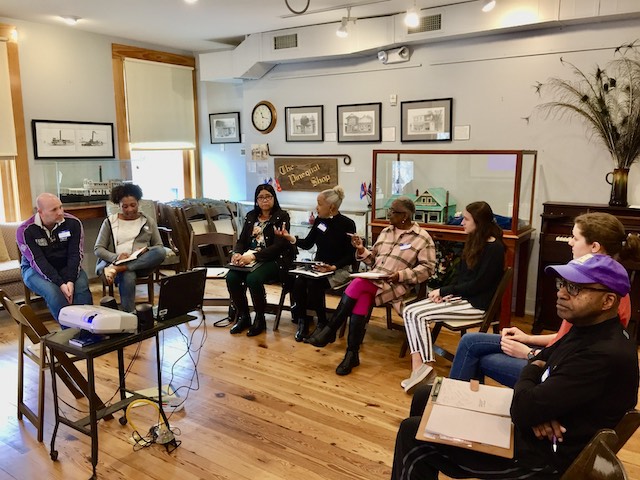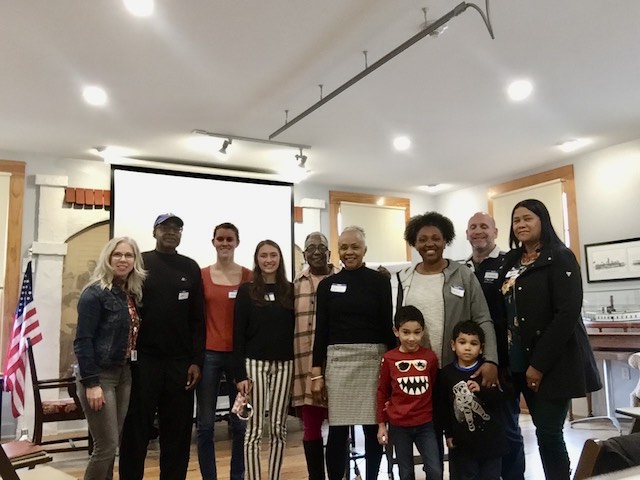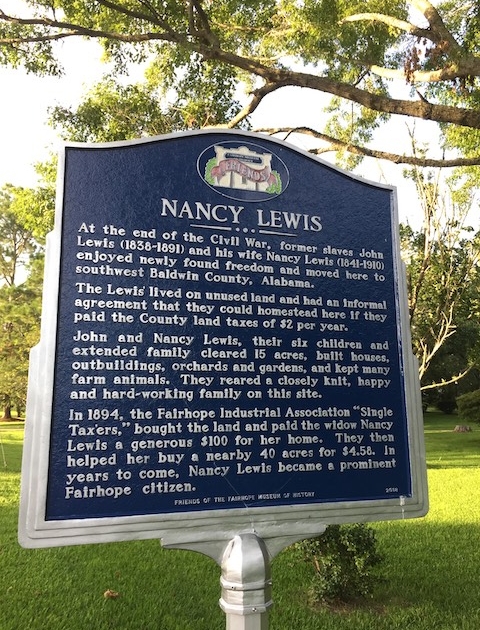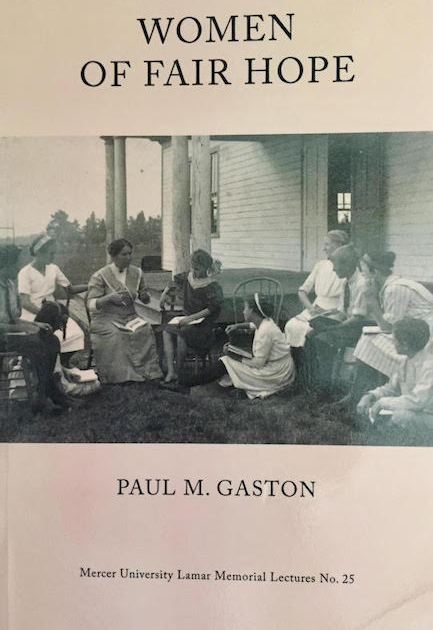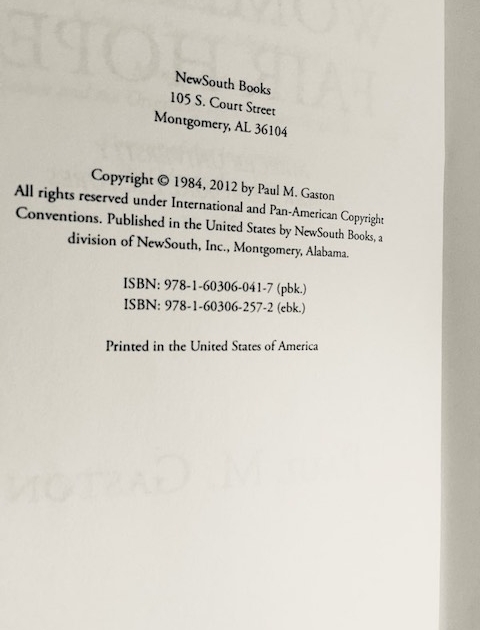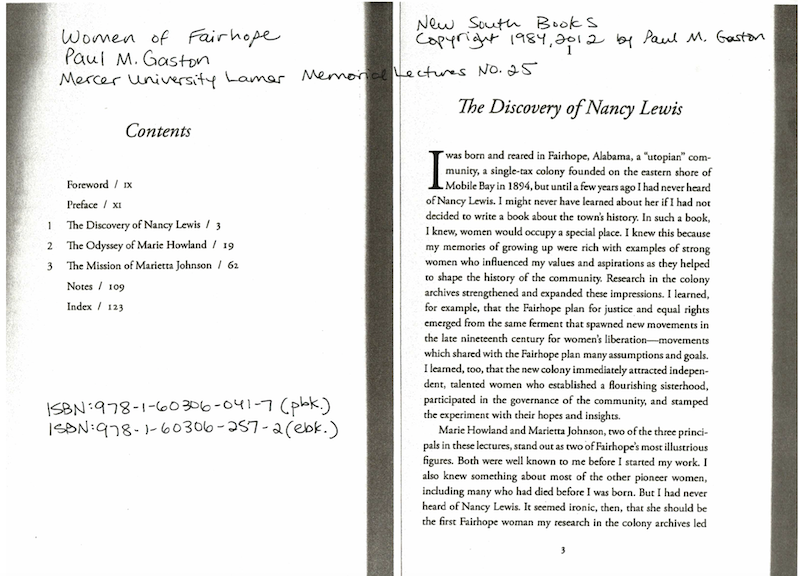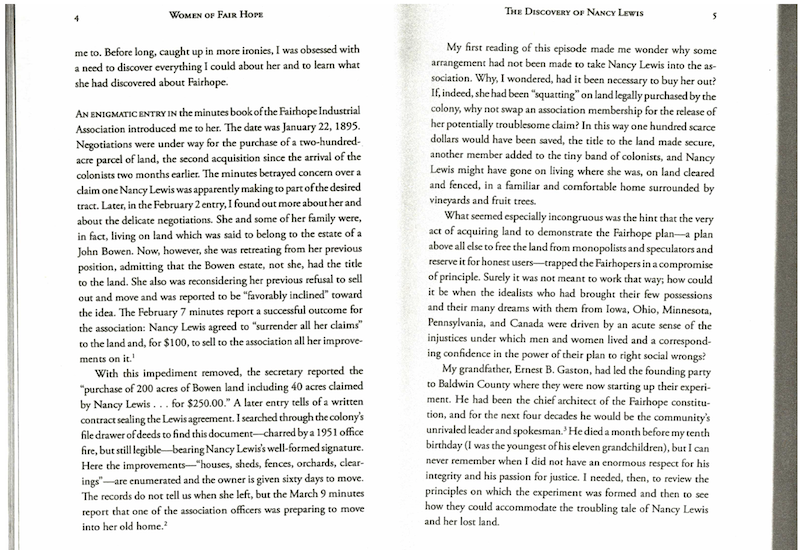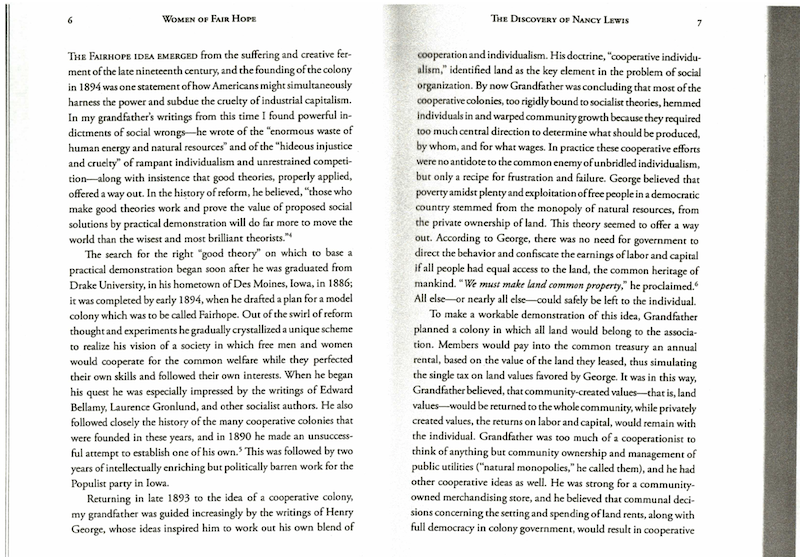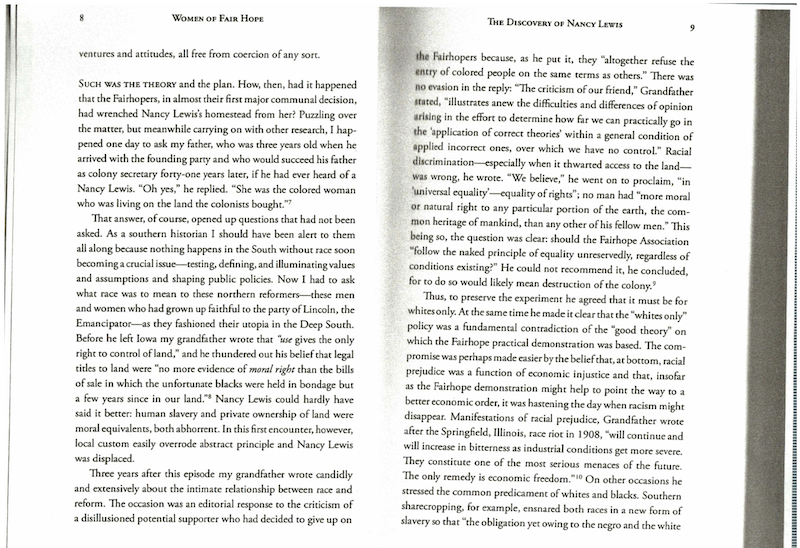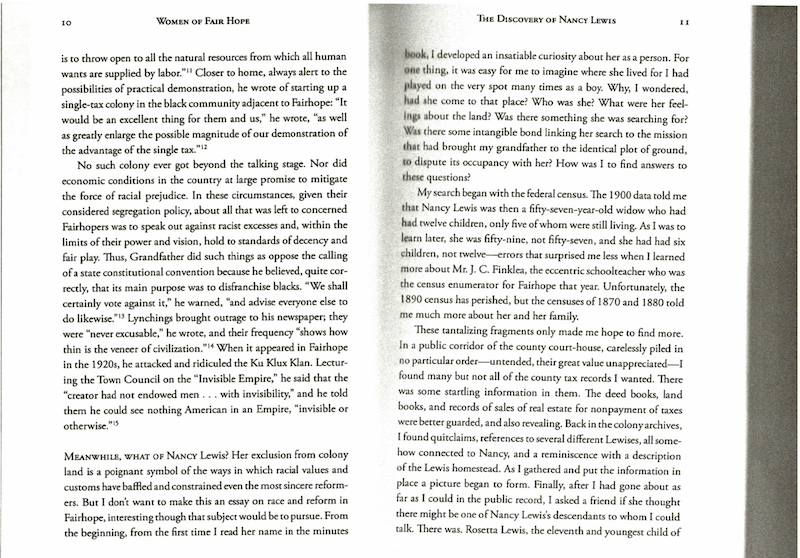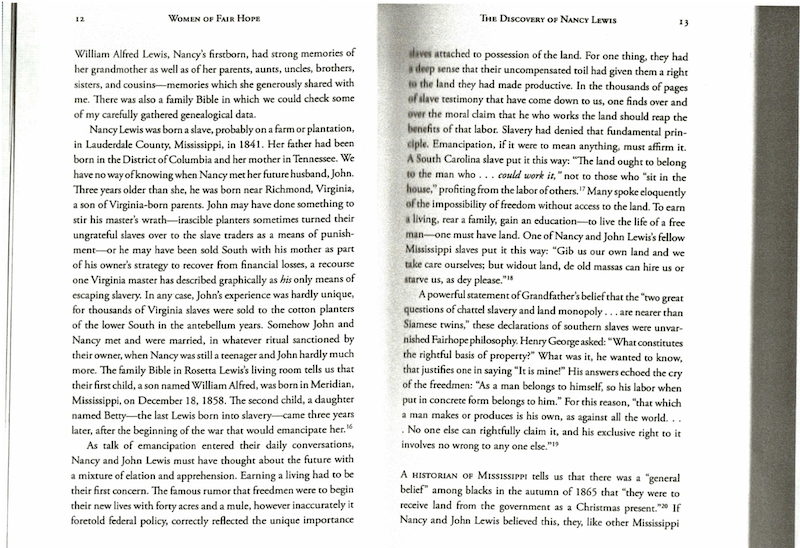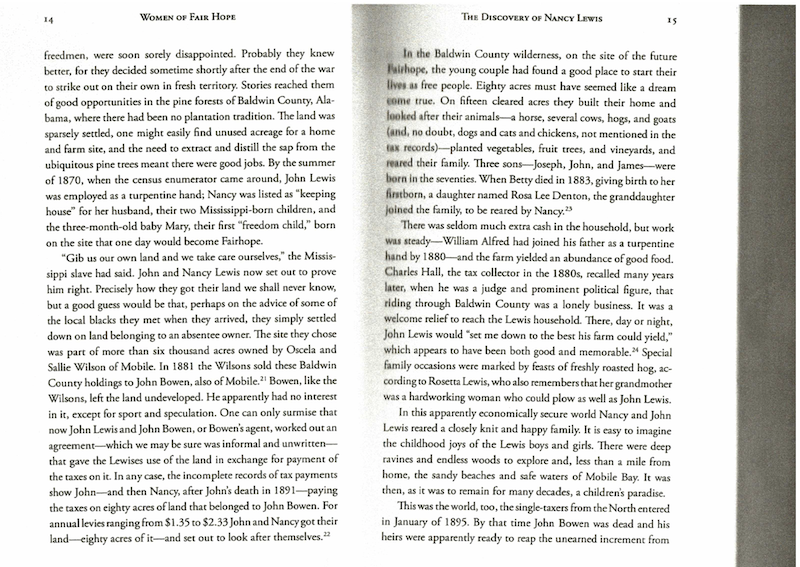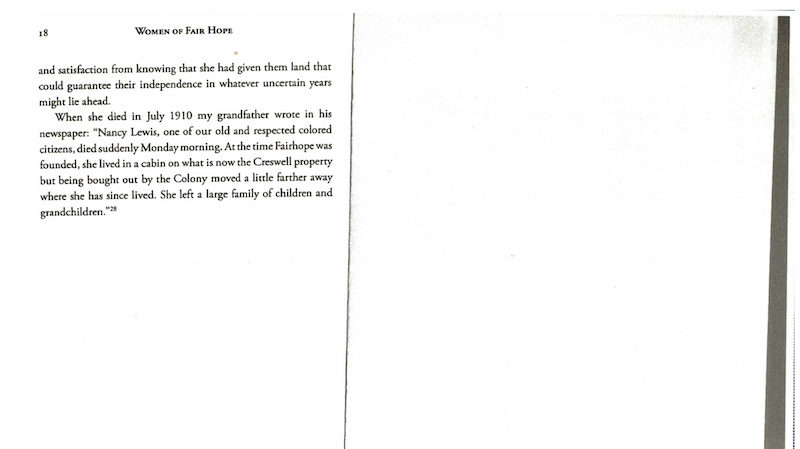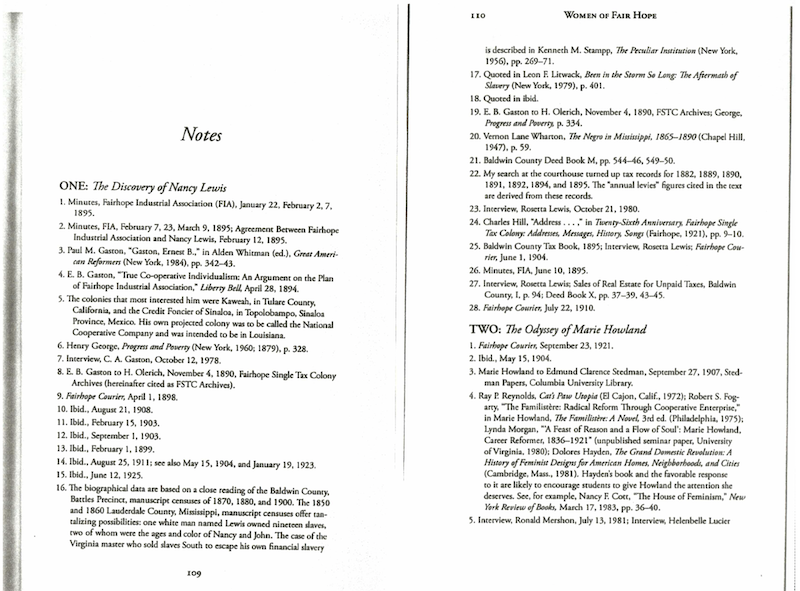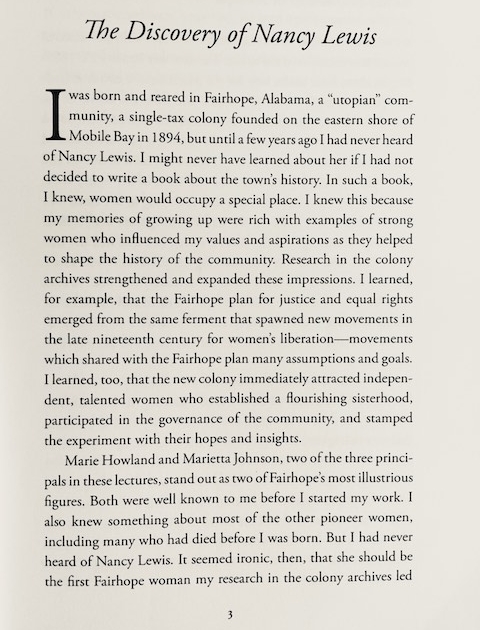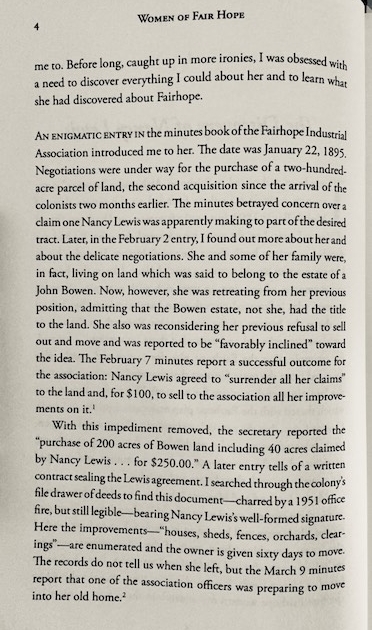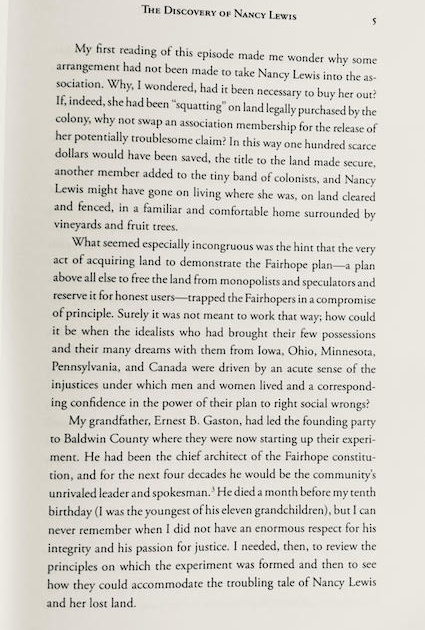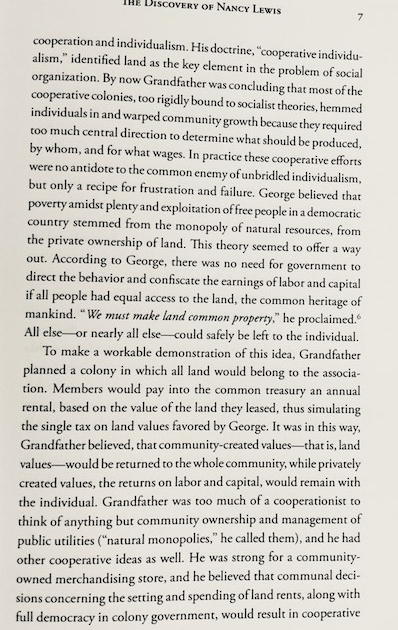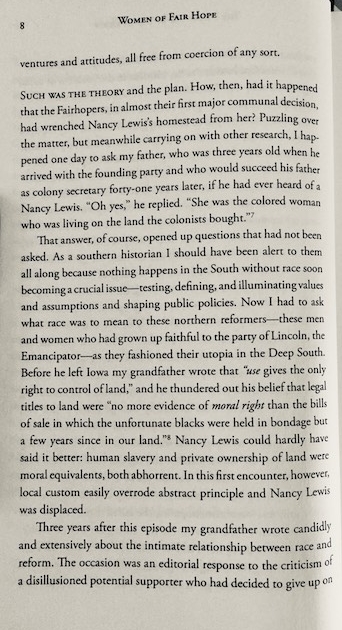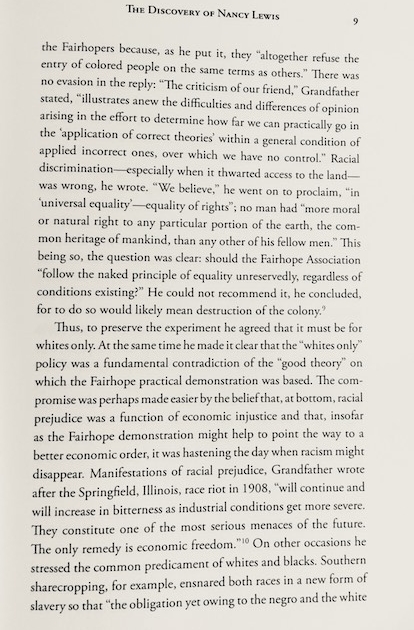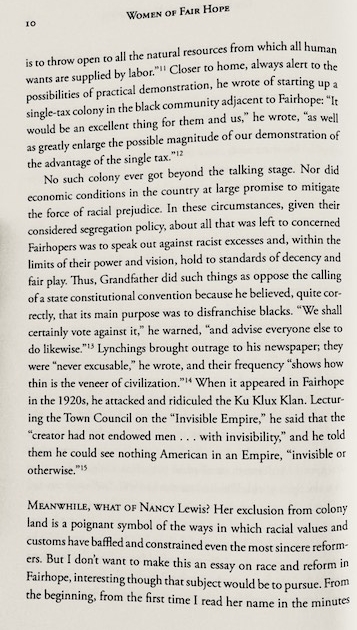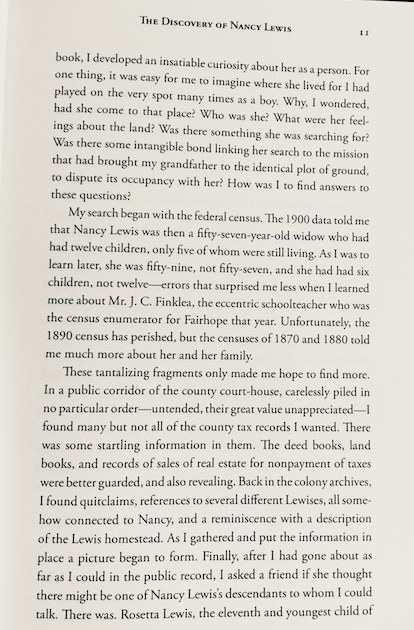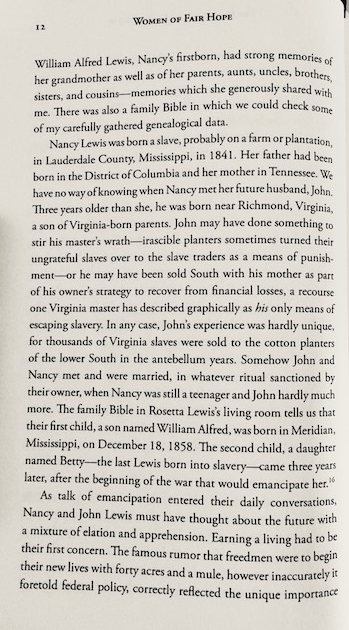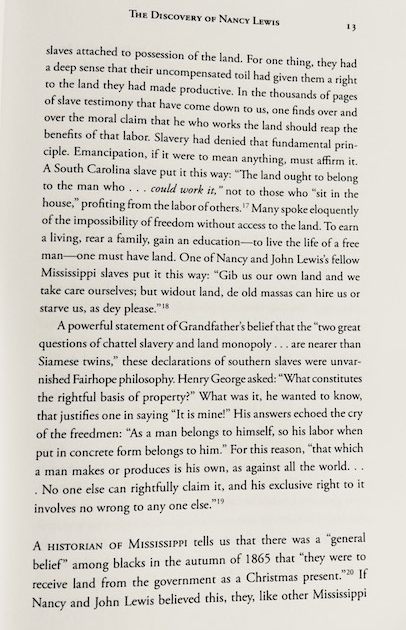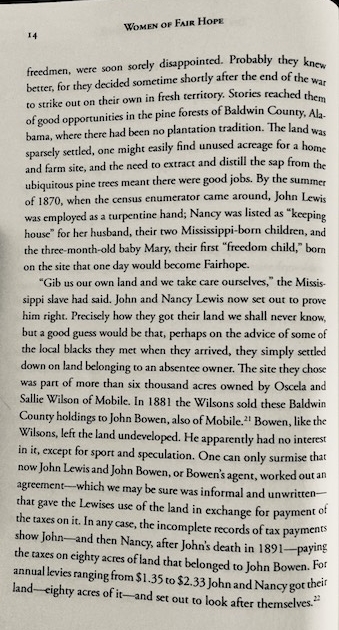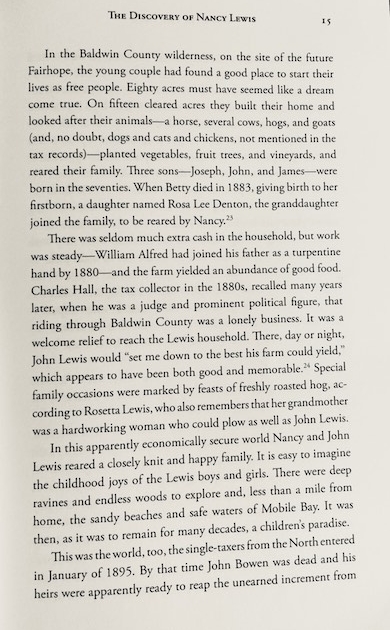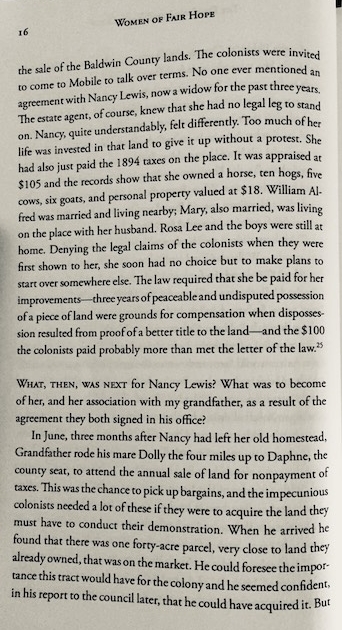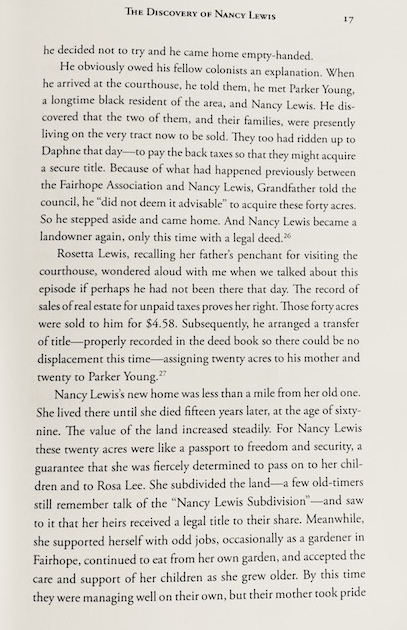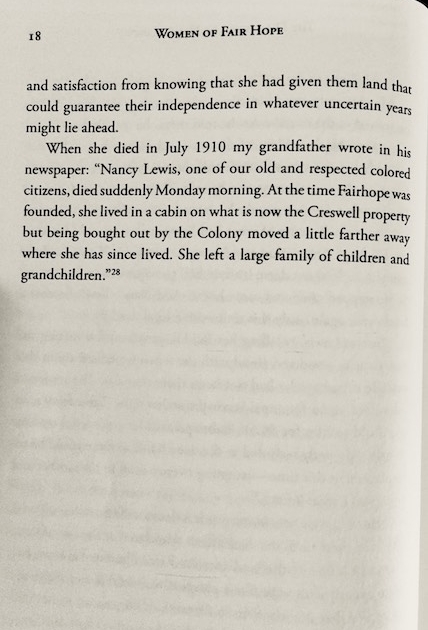Thelma J. Todd
An Interview with C. Darby Ulery, 2020
&
The Discovery of Nancy Lewis
An excerpt from Paul M. Gaston’s
Women of Fairhope, New South Books 1984, 2012
*****************
Thelma J. Todd
“Be the best you can be. If you can’t be a tree, be the best branch, or be the best leaf. Be the best you can be.”
“Be the best you can be!”
Photo: Let’s Go! Fairhope
January 16, 2025
I received the sad news today that Fairhope lost one of my favorite people on the planet. Thelma J. Todd.
I’m sharing the story I was honored to have a chance to put together about her back in 2022 to help preserve her legacy, though it’s no replacement for Thelma. She was a mentor not only to me, but a trusted advisor to many in our community. She always made time for us, took questions seriously, and always seemed to understand exactly where everyone was coming from in order to help them get to where they needed to go.
I can hear her laughing with me as I try to find words to say something, I’d stumble and be at a loss, I’d wait long enough and then she’d say exactly the right thing.
Thelma resolved so many thoughts, saved me from things that worried me so many times. Everything she said was my favorite, but this seems to feel extra right today: “Be the best you can be. If you can’t be a tree, be the best branch, or be the best leaf. Be the best you can be.” “Be the best you can be!”
Our last text, on Christmas Eve 2024, from Thelma: “May every heart that believes, every eye that sees, every ear that hears & every soul that receives be blessed by the Spirit of God today, Amen! God Be With You”
And also with you, Thelma…
Love and miss you already, my friend. Thank you for impacting my life and living to pay it forward to always help others. May we carry on your legacy in our own ways everyday. This is not goodbye, just being continued…
-C. Darby Ulery
Photo: Let’s Go! Fairhope
This story was originally published May 1, 2022 by Let’s Go! Fairhope. A few edits have been made for clarity.
Interview and write-up by C. Darby Ulery. Copyright 2022, 2025. All rights reserved.
This week’s “Did You Know?” portion of Let’s Go! Fairhope features local resident Thelma J. Todd.
A shorter version appears in this week’s newsletter. Here is the full interview:
“Did You Know?” Some of our Fairhope neighbors haven’t always been allowed to eat in local restaurants…
Born in 1946 in Fairhope, the great-great-granddaughter of Nancy Lewis, a freed slave who lived on the land before Fairhope was Fairhope, Thelma J. Todd is as sharp as a tack, vivacious, encouraging, and devoted.
Thelma received her B.A. from Rutgers, and Master of Library Science degree from Columbia. Before retiring in 2006 and moving back to the area to be near family, Thelma’s resume highlights include service at the MLK Jr. Memorial Library in Washington DC, and the Library of Congress.
Because she knows exactly who to call for an answer anytime anyone has a question about Black History in Fairhope, Thelma is often involved in historical conversations.
“Integration happened after I had graduated and was in college, I think ’69 or ’70. I went to the all-black 1st through 9th grades at Anna T. Jeanes School, and then the all-black Baldwin County Training for high school, from about ’60/’61 to ’64.” There were between 40 and 50 students in Thelma’s class.
Three of Thelma’s younger sisters went to Fairhope High School. “After integration, if you wanted to finish [with your class] at Baldwin County Training, you had to provide your own mode of transportation because they weren’t having busses to bus you from Fairhope to up to Baldwin County Training anymore. It’s called W J Carroll Intermediate School now, on Main Street, in Daphne. That was the Baldwin County Training campus. People who lived in Daphne went there for 1st through 12th grade, but Foley, Point Clear, and Fairhope students went to Anna T. Jeanes through the ninth grade.”
Not all of Thelma’s Fairhope memories are segregated.
“It was Bedsoles [department store] back then, where The Cat’s Meow is now. I don’t remember them doing anything different. They measured your feet back in those days for shoes, they had this contraption, and I don’t remember anybody saying well, no, we can’t measure your feet, or we’ve got to get another one. I don’t think they did that.”
“…where my mom worked, if we wanted to see her, you couldn’t even buy food at the restaurant. The only black folks in that restaurant were in the kitchen. “
“At any of the restaurants, however, you had to go around to the side, you couldn’t even eat in there. Better Burger, which is where Ben’s is now, on 98 Scenic, you had to go to the side window to get a hamburger or hot dog. And where my mom worked, if we wanted to see her, you couldn’t even buy food at the restaurant. The only black folks in that restaurant were in the kitchen. I’m not even sure if they had any black waitresses back then. My mom was at the Central Cafe Restaurant [today’s Bone and Barrel], then when that closed down, she went to Julwin’s. In ’83 she went to New Jersey and stayed with my aunt, when her older sister’s husband died. She stayed and got a job as a chef at Claridge Casino in Atlantic City.”
“We were raised by my mom, my aunts, uncles, and my grandmother to have the mindset to go to college after high school. After high school, I spent the summer in Ohio with my father’s oldest sister. Then, I came back home and took the train to Connecticut. One of my uncles had his own real estate business there. His name was Peter Young, and he was like another father to me. He said I could stay and go to school. Starting out, I went to Southern Connecticut State for about a year and a half. I ended up going to Philadelphia with my sister Pam, who graduated in ’65, after that. We stayed with our mom’s oldest sister, and then I got married and went to New Jersey and finished school, getting my BA from Rutgers. From there, I went to Columbia and got my MLS.”
“The American Library Association has a magazine that comes out, and they always have jobs listed. I always wanted to work for the Library of Congress, and they had a job opening for Catalogers. I took the train down to DC and took the test and passed it, but they had filled the job. I got a letter to work in the children’s division at MLK Jr. Memorial Public Library, so I worked there as a librarian. I had other jobs, too. I worked at Spiegel’s doing data entry, I got a job at a publishing company doing data entry, and then I got a job for the Navy in Philadelphia doing data entry. Sometimes I worked full time and went to school full time. I took night classes.”
“When I was at the Library of Congress, they had an internship program. I was selected from within the library, and worked for year in different departments. After that, I worked in the Congressional Liaison Division, a department between Congress and the Library of Congress. It was a division that Congress contacted for a variety of topics, farming the requests to other library divisions/departments. I ended up getting a job in the newspaper periodical reading room, and I stayed there until I retired in 2006.”
Were you well received as a student at the universities you attended? Did you experience any issues?
“Everyone dropped except for me. I refused to drop out. I told her we should get an A for effort because who spoke Chaucer nowadays?!”
“At Rutgers, we had an elderly gentleman who had tenure, he was not the best. Then there was a woman who taught Chaucer, and she pointed out to the black students that they weren’t speaking the Chaucer language. Well none of us were, white nor black. Everyone dropped except for me. I refused to drop out. I told her we should get an A for effort because who spoke Chaucer nowadays?! It’s not a language that you’re going to hear! She was quite upset with me. But I finished the class, and at graduation she had the nerve to come over and congratulate me.”
“I was one of two blacks in the class”
“At Columbia, I had one teacher in Reference. She had an “altitude” as one of my little cousins says. I was one of two blacks in the class, and when she would ask a question, I would raise my hand and she would never call on me. In one assignment, we had to look up how to find women in the Bible. And it wasn’t so much that you got the answer, but she wanted to know, what was your research, what did you do to find the answer? When I told her what my research was, she was not pleased, and she let me know it front of the class.”
‘’Well, there are going to be a lot of people leaving the North then that have a southern accent.’’
“At Southern Connecticut, I was taking a language class, and the professor was Boston-raised, and he had that heavy Boston accent. He let us know that he went to school in England. We had to do a speech in front of the class, and we had students from Kentucky, North Carolina, myself from Alabama, people from New England and other places. And he pointed me out. My accent was NOT Southern. There was one guy from Kentucky, he had a thick accent, but this instructor decided to tell me in front of the class after my speech that if I wanted to stay up North, that I had to change how I spoke. I said ‘Well, there are going to be a lot of people leaving the North then that have a southern accent.’ The class started laughing and they said ‘I can’t believe you did that.’ When I got home, I knew I was getting a D, so my uncle went with me to see the academic advisor and the counselor said well, I can only make him change it to a C, he’s got tenure.”
“I just refuse to let any of that bother me!”
“Those are the only three. Other than that, I had good experiences. And I just refuse to let any of that bother me!”
Memories of Fairhope growing up:
“We couldn’t go to Fairhope Pier, but somebody had a flatbed truck, and they would transport us to the beach”
“I was the Mayday Queen one year”
“We couldn’t go to Fairhope Pier, but somebody had a flatbed truck, and they would transport us to the beach at Edgewater and Paradise [in Daphne]. Johnson Beach, in Florida, that’s where black people went. When my aunts and uncles came home, on my father’s side, we’d pack a lunch.”
“I was the Mayday Queen one year, and we had a sweetheart dance one year in the 8th or 9th grade. We sold fish and someone made candy fudge to raise money. It was a really good community. We were really involved in a lot of stuff the church did.”
“One of the things that affected me and made me so open to other cultures was that we traveled every year with my grandmother. Ever since I was six, we’d go to New York, Connecticut, Illinois, we’d take the train that left from Mobile and travel up north until she got sick when I was in the 9th grade. It was wonderful riding the train. It was interesting because we would go to the dining car, and we would usually be the only blacks in that car, and we were never told we couldn’t eat there. That was the 1950’s.”
What keeps her in Fairhope?
“My family. I still have a large family here in Fairhope. It’s a beautiful area. I do have issues sometimes being surrounded by [opposing politics], but I’ve met a lot of wonderful people, white and black. People from the Hope Community, I haven’t been able to do much since I’ve been sick, but I have a lot of friends, my church, Twin Beech A.M.E. Zion, my sisters, we are close.”
Thoughts on Fairhope today?
“Fairhope is a beautiful place, but it’s very expensive. People can’t retire unless they’ve had a good business, so most [people who are moving in] are Caucasian, probably have a good 401 and things like that. As for people who work in Fairhope, some live all the way in Mississippi because it’s so expensive to live here. I bought my house in 2006. If I had to move here today, I wouldn’t be able to afford it.”
“As for the political climate, over the years, sometimes I have seen it be disrespectful, and I was disappointed. The only time the people who are running for City Council will come into the black community is when they need votes, to serve hotdogs and hamburgers, and you won’t see them for 4 years until they need votes. But they probably don’t need our vote. That’s the only time I’ve seen them in black neighborhoods.”
“I hate to say this, but when I’m gone, and people after me, it will be even fewer. Fairhope’s white population is something like 92%, black population might be 5.3 or 6-point-something, and the rest Native American, Hispanic, Asian. As we die out, Fairhope is going to be a predominately – already is – a white community. Unless you were born here and you wanted to come back when you retire, you’re not going to have anyone black come here to retire. We talk about that all the time, that’s not good.”
Thelma Todd (right of center) was instrumental in helping to set up the first and only meeting of the Fairhope-Area Black History Research Club Meeting, before the Covid-19 Pandemic ended activities.
Photo: Let’s Go! Fairhope, 2020
Thelma (center, back) attended the first and only meeting of the Fairhope-Area Black History Research Club Meeting, before the Covid-19 Pandemic ended activities.
Photo: Let’s Go! Fairhope, 2020
Thelma’s favorite quotes:
“Service to others is the rent you pay for your room here on earth”
-Muhammad Ali
****
“Never make someone a priority when all you are to them is an option.”
-Maya Angelou
****
“There was a poem we learned in Elementary school that went something like ‘Be the best you can be. If you can’t be a tree, be the best branch, or be the best leaf. Be the best you can be.'” “Be the best you can be!”
*****************
Nancy Lewis
Note from the post author: The section below is intended to inform audiences about the existence of a chapter called “The Discovery of Nancy Lewis” in Paul M. Gaston’s 1984 book, Women of Fairhope. As you may recall from the beginning of this post, Nancy Lewis was Thelma J. Todd’s great-great grandmother. It is recommended you seek out a copy for yourself and not strain your eyes trying to read the material as it appears below. These images were saved for personal use, and not originally intended to be shared. After Thelma’s recent passing, however, the idea was to include them here as an attempt to help raise awareness and share as educational information towards her family’s legacy. If anyone objects, or has a wiser presentation method, feel free to reach out with critique or advice. I wish Thelma was here so that I could ask her what to do.
– CDU / LG!F
“The Discovery of Nancy Lewis”
A chapter from Women of Fairhope by Paul M. Gaston
The content above is sponsored by Let’s Go! Fairhope.
Visit letsgofairhope.com to sign up for the newsletter, access the calendars, and learn how to submit your event-related information. Sponsorships and advertising opportunities are available.
Copyright 2025 Let’s Go! Fairhope. All rights reserved.

